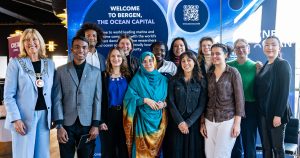Ianira Vieira (2024)
One Ocean Week is an annual event, organised for the first time in 2023, about the sustainable use of the oceans as part of the UN’s Oceans Decade. In the 2024 edition, Bergen Kommune established the One Ocean Youth Panel, inspired by the High-Level Panel for a Sustainable Ocean Economy.
The profound ties between humanity and the ocean extend over time. For the participants in One Ocean Week and members of the Youth Panel, this attachment is extremely personal, anchored in childhood experiences, indigenous knowledge, and a shared commitment to the marine ecosystem. It is through these intimate connections in One Ocean Youth Panel that a collective determination is established to protect every facet of marine life, recognising that every organism, irrespective of its economic value, merits the same consideration and protection.
In Norway, a nation renowned for its wealth and environmental consciousness, the contrast is particularly salient, as the country confronts the paradox of its oil exploitation and the spectre of deep-sea mining. A member of the panel exposed the challenges facing local and indigenous communities and the natural habitats they value. In Bergen, pollution pressures are rampant and economic interests prevail over the need for sustainable solutions. As in the Indian state of Kerala, local communities are experiencing the consequences of policies made far from the coast – policies that may threaten the very resources on which these communities depend for their sustenance and livelihoods. In Greenland, the environmental implications are severe, vivid, and intrinsically related to climate change. One panellist emphasised the problems confronting this territory, from melting ice and rising sea levels to the sustainability of fisheries and the livelihoods of indigenous peoples, pointing to the importance of a holistic approach to marine conservation that embraces cultural heritage and recognises the unique contributions and interests of indigenous communities. In Egypt, a pushback against the wave of plastic pollution continues. In this context, a panellist described collective clean-up initiatives that unite community members, with each piece of litter removed deepening the bond between people and their coast. In West Africa, international fishing agreements collide with local communities’ right for food security, transparency and an assessment of resources that incorporates economic, environmental, and social considerations, appealing to a larger practice in which resource extraction must be balanced with the agency of local inhabitants. One panellist addressed geopolitical issues in Western Sahara, exploring the ethics of international trade and fishing policies in disputed territories, pointing to government accountability for sustainable resource extraction that respects the rights and livelihoods of local and indigenous peoples.
In general, the drive for an integrated ecosystem management approach is evident as panellists emphasise the imperative for humanity to embrace more holistic measures to address human-induced environmental challenges, such as the proliferation of plastics affecting marine life. In order to accomplish this, inclusive and equitable international governance – responsive to economic as well as non-economic interests – is critical.
One Ocean Youth Panel presents a convergence of young people from various parts of the world, whose personal stories and experiences provide a panorama of the interdependence of human life with the vast oceans that sustain life. From community-led initiatives to the broader impacts of industrial and geopolitical activities, the One Ocean Youth Panel discussions demonstrated the multitude of complex issues facing ocean health and the challenges of protecting vital habitats such as kelp and mangroves forests, addressing pollution and advocating for sustainable management of marine resources.
One Ocean Youth Panel is composed by Amber LeBlanc (Canada), Chineye Rebone Chikwado (South Africa), Christine van der Horst (The Netherlands), Daniel Caceres Bartra (Peru), Emilia Berndtsson (Finland), Fatma Moulay (Western Sahara), Ingeborg Rønning (Norway), Laisa Nainoka (Fiji), Leno Ignatious (India), Ianira Vieira(Guinea-Bissau/Portugal), Miraflor Santos (USA/The Philipines), Nivi Rosing (Greenland), Rabea Rogge (Germany), Rofayda Fayed (Egypt), Titilope Ajimuda (Nigeria), Jahawi Bertolli (Kenya/Italy).
Reflections written by Ianira Vieira, Master’s student at Politics and Governance of Global Challenges (UiB), volunteer at LawTransform and member of the One Ocean Youth Panel.
Photo: Ole Henning Bøe

